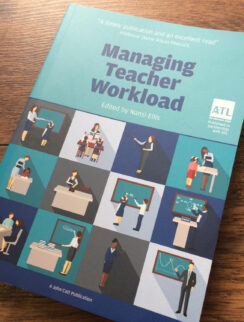Not a week goes by without someone mentioning the ever-increasing volume of work that teachers have to endure.
So, you cannot help but be acutely aware of the irony of adding to your own workload by agreeing to review a book on workload. So imagine my delight when a remarkably slim book landed on my doormat.
Managing Teacher Workload is a compilation of essays from contributors gathered by the Association of Teachers and Lecturers (ATL). The contributions are intended as a starting point for discussion on excessive workload and how to begin to tame the beast.
Each chapter has a different focus. Mary Myatt provides a necessary overview of the government’s emerging reports on tackling workload, and issues relating to teaching, data and marking.
Joe Pardoe, with a warm and readable style, addresses the ways in which initial teacher training can best equip those new to the profession with the skills they will need to cope with the pressures of the job.
His assertion that “it is important that the reflection element of teaching is reformed to focus not only on the pressures of the job, but also reducing less effective work” lands the responsibility for decreasing workload back in the laps of training providers. It is not an unreasonable suggestion: start by training teachers to understand what effective work looks like. Then, the baton can be handed to schools themselves.
Is this book going to solve all your workload problems? Probably not
Ellis then guides us through chapters on designing assessment systems and the curriculum in a climate of rapid change, making time for professional development and a detailed, useful guide to well-being from Julian Stanley, the chief executive of Education Support Partnership. The book ends with an often overlooked aspect of managing workload: the way in which governors can contribute to a healthy teaching workforce by breaking the Sisyphean labours of their workload.
Is this book going to solve all your workload problems? Probably not. It is far from being a listicle offering tasty titbits. While the quick guides that punctuate the book do contain immediate strategies that classroom teachers may find useful in daily practice, the focus is very much on the philosophy and leadership of schools.
In fact, I would suggest that it lends itself far more to the school leader than it does to the new classroom teacher. This is exemplified in Lee Card’s chapter on designing assessment systems and curricula – while I appreciate his depth of detail, I am left having to eke out the ways in which effective systems reduce workload. They are there, it just takes a while to get to them.
It is, in any case, packed with ideas. Do not be fooled by its brevity. Those attuned to the traditional vs progressive debate may spot the variation in approaches by individual contributors – Toby French’s chapter stands out starkly as a flag-bearer for traditionalism as he writes cogently on managing behaviour to reduce workload. In doing so, he inadvertently signposts one of the difficulties in dictating systems to help teachers cut down on workload – the dichotomy between providing autonomy for teachers and providing structures that eliminate variation and uncertainty.
Rather than being a chapter that sticks out uncomfortably, it serves as a reminder that workload is not a partisan issue. As one can expect from a union publication, the content fairly represents the spectrum of teacher identity and belief and, in that sense, is all the more stimulating.
Perhaps in my cynicism about union publications, I expected a call to arms against government policy. The final note from general secretary Mary Bousted leaves the reader with a clear sense that ATL believes workload can only be tackled through a combined effort between teacher, leader and national government. While Managing Teacher Workload does not absolve government of its responsibility to decrease workload, it does not absolve the teacher either.
How refreshing!













I really rate the book too, Bennie, and I hope busy teachers will make/find time to read it. I’m sure it could help. It’s not solely teachers’ responsibility to find solutions, but they do have some agency, and, in my view, need to use it to help themselves too – and learn from those who have practical suggestions.
And I hadn’t come across the word ‘listicle’ before! I do love a new word – thank you (you English teacher, you…)